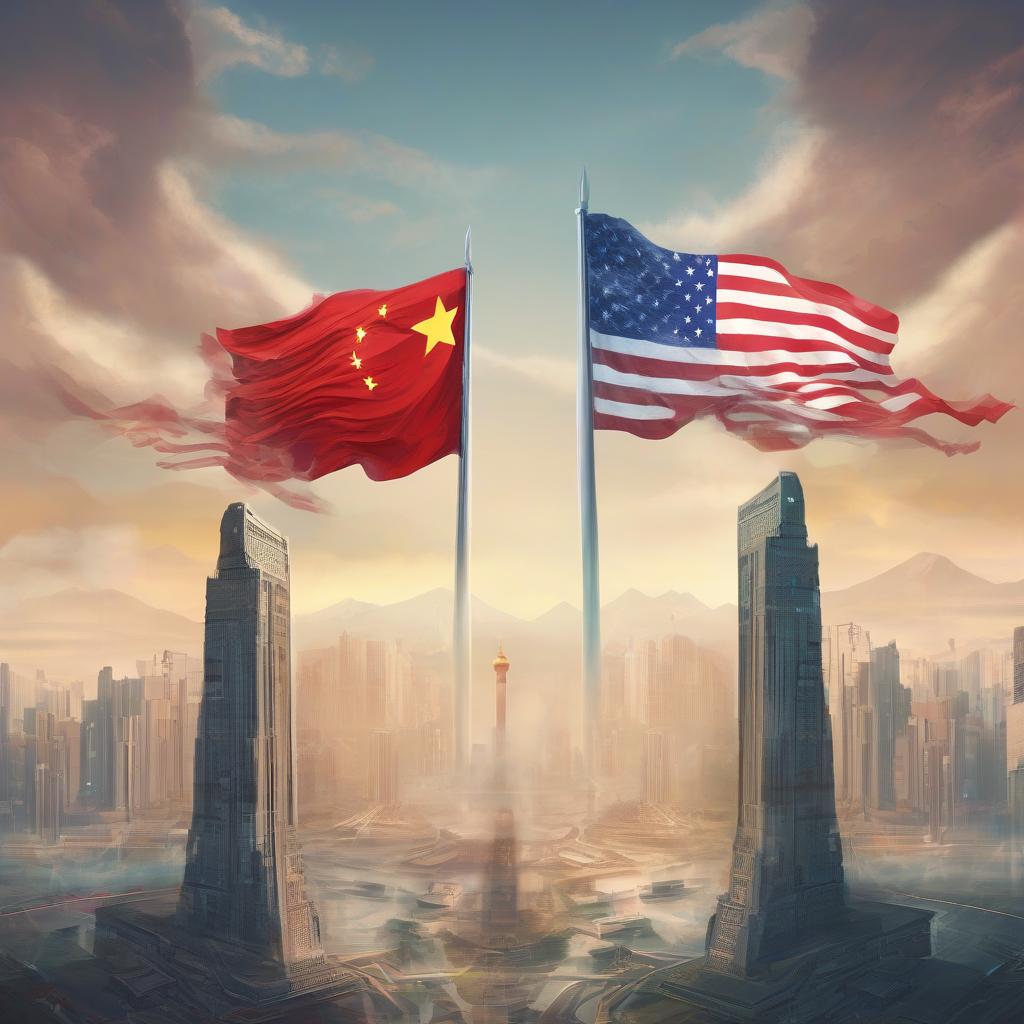In an era of great power rivalry, Africa has once again emerged as a theatre for competition among global superpowers. As the Cold War 2.0 narrative gains traction and spans areas such as mineral resources, trade, political and financial systems, and global institutions, another area requires careful attention. Digital technologies are increasingly becoming instruments of strategic and security importance, and the US-China technological rivalry carries global implications.
Due to weak regulation and economic dependency, African states are particularly vulnerable to these tensions. Yet, while there are significant risks, there are also emerging opportunities. African states will need to tread carefully between Beijing and Washington to balance these considerations.
As economist Henry Tugendhat noted in a 2021 analysis for the United States Institute for Peace, “a battle is unfolding between the United States and Chinese tech firms over who will control what millions of people in Africa can see, hear, read, and say.”
China’s Huawei is the market leader in 5G networks, which are set to dominate the telecommunications space for the foreseeable future. According to a 2023 Voice of America (VOA) article, “in sub-Saharan Africa, where less than 30% of people use the internet, most governments welcome China’s investment in digital infrastructure – a part of the Belt and Road Initiative dubbed the ‘Digital Silk Road’. Because of Chinese government subsidies, they see it as a cheaper path to greater connectivity.” China is well aware of the strategic geopolitical advantage of such soft-power technology for its future literal and figurative Belt and Road initiatives.
Similarly, many western nations are aware of the political and economic risks involved in allowing Chinese companies to set up virtual trading ports globally. The US has already banned Huawei at home, saying it’s a risk to national security. There is also a push on Capitol Hill to ban TikTok.
Civil society activists across the democratic world have also expressed concerns over data security, personal privacy, and freedom of speech linked to Chinese-controlled technology. In the context of great power rivalry, the strategic threat of Huawei’s 5G dominance is less about security and more about economic control over on-ramps and off-ramps to the virtual information highways that now represent the bulk of future global economic growth.
Advocates of the US-led approach argue that the quality and standards associated with US technology ensure that citizens are protected from exploitation and abuse of power. Moreover, they argue that corporate governance and transparency will benefit African citizens over the long term.
A 2023 Project Syndicate article by Nate Allen and Nanjira Sambuli observes that Africa’s strategic importance is now dawning on American tech firms. They highlight significant investments by Microsoft, Amazon, and Meta in recent times, noting that “the impetus for these investments is the growing recognition that the future of America’s technology industry hinges on expanding its African customer base.” They go on to add, “Today, a little over a third of Africa’s 1.4 billion people use the internet, representing a small fraction of the world’s internet users. But the continent’s population is projected to reach 2.5 billion by 2050 – one-quarter of the global total. The vast majority of Africans are expected to become internet users by then, offering tech companies opportunities that no other region can match.”

Taken together, it is evident that competition for technological dominance in Africa is intensifying. While Chinese companies lead in some sectors, such as telecommunications hardware, US companies prevail in software platforms, operating systems, and search on the continent.
The ‘tech trade-off’ is something African policymakers need to wrestle with, given the contrasting versions of the internet offered by Beijing and Washington and the relative benefits of each. On the one hand, emerging economies stand to reap the benefits of Chinese technology – cheap communications, increased access to global markets, and economic opportunity – which, for many, outweigh the downside, namely a potential loss of autonomy and freedom. This is the primary consideration in regions where internet access matters more to citizens than data privacy.
Yet, at the same time, there are very serious and legitimate governance concerns associated with such technology. From a political perspective, a criticism of Chinese technology is that it may lead to increased censorship and control over information, reflecting China’s authoritarian model of internet governance. For example, Chinese technology companies, such as Huawei and Hikvision, have developed advanced surveillance systems widely used to monitor public spaces, internet traffic, and individual behaviour. In the wrong hands, these systems can be used by governments to monitor and control dissent, restrict freedoms, and maintain political stability through surveillance, creating a form of digital dictatorship that, it is argued, would adversely affect the quality of governance in Africa and lead to greater illiberalism.
Second, there are also regulatory concerns. African countries may adopt different regulatory standards based on the technology they use, shaped by either US or Chinese norms. This divergence could complicate regional integration efforts and policy coordination, given the lack of uniformity among African states.
The third concern relates to sovereignty and national security. Relying on foreign technology providers is likely to limit states’ control over critical digital infrastructure and data governance, making states vulnerable to exploitation. This is especially relevant in the context of the “digital arms race” among major global powers and the emerging battle for AI supremacy. Geopolitical pressures will likely see African nations forced to pick sides, which may have financial and political consequences if mishandled.
Now, as the pace of technological decoupling increases, how can the continent’s leaders navigate these challenges effectively? From a geopolitical perspective, African countries must hone and better project their agency, according to a 2023 publication by Mzukisi Qobo and Mjumo Mzyece for the South African Institute of International Affairs (SAIIA). The authors argue that Africa’s meaningful participation in shaping the global system can be realised only by reducing reliance on major powers.
Central to this will be building strategic partnerships with diverse countries to ensure neither Washington nor Beijing entrench dominance. Meaningfully engaging with digital players such as India, the European Union, Japan, and South Korea would reduce dependency on any single country and leverage the strengths of different technological ecosystems.
These partnerships must then complement home-grown solutions and platforms, including building the digital infrastructure, upgrading digital skills, and broadening citizen participation in the digital economy. By leveraging its comparative advantages and exploiting shifts in global supply chains, Africa can turn the digital race between the US and China into a catalyst for its own benefit.
Greater regional coordination would improve the continent’s collective bargaining power in negotiations. To this end, African leaders should leverage the African Continental Free Trade Agreement (AFCFTA) to create a single continental digital market. Such a move would enhance economies of scale, attract investment, and facilitate the movement of digital goods and services across the continent. Policymakers will need to invest heavily in local R&D, skills, and digital infrastructure to build competitive workforces. This would allow for greater autonomy over critical digital infrastructure and data.
For Africa to capture the full benefits of potentially transformative technologies like 5G, African participation in the development of the associated technology standards will be essential. The importance of appropriate, customised regulation cannot be overstated.
But, as University of Cape Town’s Mandira Bagwandeen warned in a 2021 analysis, external dependency and insufficient investment in the African tech industry carry significant risks. “Given the tussle for dominance between digital democracies and digital autocracies, Africa must, once more, avoid becoming a proxy for those with big sticks and deep pockets – albeit on a different kind of battlefield. Now more than ever, it is necessary that African policymakers and legislators advocate for ICT legislation and regulations to be transparent, accountable and open to reform.”
She adds, “Africans at a local, national, and regional level must play an active role in ensuring that technology is designed, developed, and implemented to meet African needs and advance African economies.” Robust regulatory frameworks will ensure digital sovereignty is not compromised and appeal to potential investors looking to take advantage of the continent’s vast market size.
In conclusion, tech decoupling and geopolitical tensions between the US and China will present both challenges and opportunities for Africa. These impacts will be felt in areas such as political alignment, regulatory frameworks, institutional capacity, and the balance between state control and civil liberties. African governments must carefully navigate these influences to ensure they can leverage technology for development while maintaining sovereignty and protecting citizens’ rights.

RONAK GOPALDAS is a director at Signal Risk, an exclusively African risk advisory firm. He was previously the head of country risk at Rand Merchant Bank (RMB) for a number of years, where he managed a team who provided the firm with in-depth analysis of economic, political, security and operational dynamics across sub-Saharan Africa. He holds a BCom degree in philosophy, politics and economics (PPE) and a BCom (Hons) from the University of Cape Town (UCT). He also has an MSc in finance (economic policy) through the School of Oriental and African Studies (SOAS) in London.[



